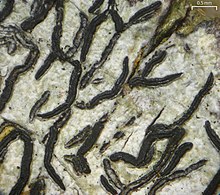Graphidaceae
The Graphidaceae are a family of lichens in the order Ostropales.[1][2][3]
| Graphidaceae | |
|---|---|
 | |
| Graphis desquamescens | |
| Scientific classification | |
| Kingdom: | Fungi |
| Division: | Ascomycota |
| Class: | Lecanoromycetes |
| Order: | Ostropales |
| Family: | Graphidaceae Dumort. (1822) |
Distribution and ecology
The vast majority of Graphidaceae species are restricted to the tropics.[4]
Most Graphidaceae species are epiphytic (i.e. they grow only on plants).[5]
Genera
A recent (2020) estimates places 31 genera and about 990 species in Graphidaceae. The following list indicates the genus name, the taxonomic authority, year of publication, and the number of species:[6]
- Allographa Chevall. (1824) – 183 spp.
- Amazonotrema Kalb & Lücking (2009) – 1 sp.
- Anomalographis Kalb (1992) – 2 spp.
- Anomomorpha Nyl. ex Hue (1891) – 8 spp.
- Creographa A. Massal. (1860) – 1 spp.
- Cryptoschizotrema Aptroot, Lücking & M.Cáceres (2019) – 1 sp.
- Diaphorographis A.W.Archer & Kalb (2009) – 2 spp.
- Diorygma Eschw. (1824) – 74 spp.
- Flegographa A.Massal. (1860) – 1 sp.
- Glyphis Ach. (1814) – 7 spp.
- Graphis Adans. (1763) – ca. 275 spp.
- Halegrapha Rivas Plata & Lücking (2011) – 9 spp.
- Hemithecium Trevis. (1853) – ca. 50 spp.
- Kalbographa Lücking (2007) – 5 spp.
- Leiorreuma Eschw. (1824) – 18 spp.
- Malmographina M.Cáceres, Rivas Plata & Lücking (2011) – 1 sp.
- Mangoldia Lücking, Parnmen & Lumbsch (2012) – 2 spp.
- Pallidogramme Staiger, Kalb & Lücking (2008) – 13 spp.
- Phaeographis Müll.Arg. (1882) – ca. 180 spp.
- Platygramme Fée (1874) – 30 spp.
- Platythecium Staiger (2002) – 27 spp.
- Pliariona A.Massal. (1860) – 1 sp.
- Polystroma Clemente (1807) – 1 sp.
- Pseudochapsa Parnmen, Lücking & Lumbsch (2012) – 18 spp.
- Pseudotopeliopsis Parnmen, Lücking & Lumbsch (2012) – 4 spp.
- Sarcographa Fée (1825) – 37 spp.
- Sarcographina Müll.Arg. (1887) – 6 spp.
- Schistophoron Stirt. (1876) – 5 spp.
- Thalloloma Trevis. (1853) – 20 spp.
- Thecaria Fée (1825) – 4 spp.
- Thecographa A.Massal. (1860) – 3 spp.
gollark: Does it support SI prefixes?
gollark: Can you have MULTIPLE pencils?
gollark: ++delete comedy
gollark: Not even <@!341618941317349376> can!
gollark: No, there is no "submit" button so it accepts *no* passwords.
References
- Baloch, Elizabeth; Lücking, Robert; Lumbsch, H. Thorsten; Wedin, Mats (2010). "Major clades and phylogenetic relationships between lichenized and non-lichenized lineages in Ostropales (Ascomycota: Lecanoromycetes)". Taxon. 59 (5): 1483–1494.
- Mangold, Armin; Martín, María P.; Lücking, Robert; Lumbsch, H. Thorsten (2008). "Molecular Phylogeny Suggests Synonymy of Thelotremataceae within Graphidaceae (Ascomycota: Ostropales)". Taxon. 2: 476–486.
- Rivas Plata, Eimy; Lücking, Robert; Lumbsch, H. Thorsten (2012). "A new classification for the family Graphidaceae (Ascomycota: Lecanoromycetes: Ostropales)". Fungal Diversity. 52: 107–121. doi:10.1007/s13225-011-0135-8.
- Lücking, Robert; Tehler, Anders; Bungartz, Frank; Rivas Plata, Eimy; Lumbsch, H. Thorsten (2013). "Journey From the West: Did Tropical Graphidaceae (Lichenized Ascomycota: Ostropalales) Evolve from a Saxicolous Ancestor Along the American Pacific Coast?". American Journal of Botany. 100 (5): 844–856. doi:10.3732/ajb.1200548. PMID 23594913.
- Lücking, Robert; Tehler, Anders; Bungartz, Frank; Rivas Plata, Eimy; Lumbsch, H. Thorsten (2013). "Journey From the West: Did Tropical Graphidaceae (Lichenized Ascomycota: Ostropalales) Evolve from a Saxicolous Ancestor Along the American Pacific Coast?". American Journal of Botany. 100 (5): 844–856. doi:10.3732/ajb.1200548. PMID 23594913.
- Wijayawardene, Nalin; Hyde, Kevin; Al-Ani, LKT; S, Dolatabadi; Stadler, Marc; Haelewaters, Danny; et al. (2020). "Outline of Fungi and fungus-like taxa". Mycosphere. 11: 1060–1456. doi:10.5943/mycosphere/11/1/8.
This article is issued from Wikipedia. The text is licensed under Creative Commons - Attribution - Sharealike. Additional terms may apply for the media files.